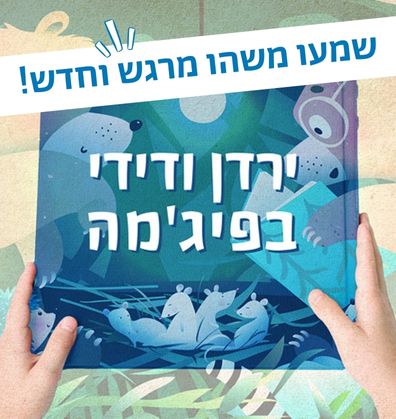Ima asks Yossi to go to the shop and buy some milk and bread. Instead, Yossi returns home with a puppy dog, a harmonica and a flower. What happened to Yossi on the way to the store? And how will Ima react when Yossi brings her these gifts?
This classic Israeli children’s rhyme by O. Hillel provides a wonderful opportunity for families to discuss the value of adapting childrearing to the unique talents and disposition of children, as expressed in the saying (Proverbs 24:6): “Educate the youth according to his ways”. The story also demonstrates the importance of having faith in each and every person’s good intentions, as illustrated by the saying (Avot 1:6): “Judge every person to the side of merit”.
“Educate the youth according to his ways”(Chanoch lana’ar al-pi darko)
Yossi is a special child. He functions in unexpected ways, and his mother accompanies him. Sometimes she is surprised by his actions, but she always succeeds in finding the good and the special in him.
Like Yossi, every child has his own special “way”. Every person creates a unique path and we accompany him as he goes along it: “Educate the youth according to his ways, and when he is old he will not depart from them.” (Proverbs, ch. 22, verse 6). Throughout the years we, the parents, see the special traits of our children. It’s interesting to ponder what kind of person Yossi will turn out to be when he is grown up…with his imagination, his
sensitivity and his kindheartedness. And your children – what will they be when they mature?
“Judge every person to the side of merit” (“Vehaveh dan et kul he’adam l’kaf z’chut”) Mommy waits for Yossi. At first she is impatient: “Where is Yossi? There’s no milk.” Afterwards she begins to worry about him: “What happened to Yossi? There’s no bread.” And finally she gets angry: “For heavens sakes, Yossi. There isn’t even an olive.” But when he returns she sees his enthusiasm and feels that his intentions were good. For everyone it is sometimes difficult to think positively about another person, but it isn’t good to worry or to be angry. Joshua ben Peracheya, who was the head of the Sanhedrin during the period of the Mishna, said: “And judge every man towards merit” (Pirkei Avot, ch. 1, verse 6). (“Vehaveh dan et kul he’adam l’kaf z’chut”) The Hebrew expression “kaf z’chut” refers to scales used for weighing, which are a symbol for judgment. He suggests to us that we “weigh” others positively, on the side of good, and that we see at the outset the good side of every person.
Age Group: Preschool (3-5)
Copies Distributed:
60,000
Publishing:
עם עובד
Year of Distribution:
Tashab 2011-2012




